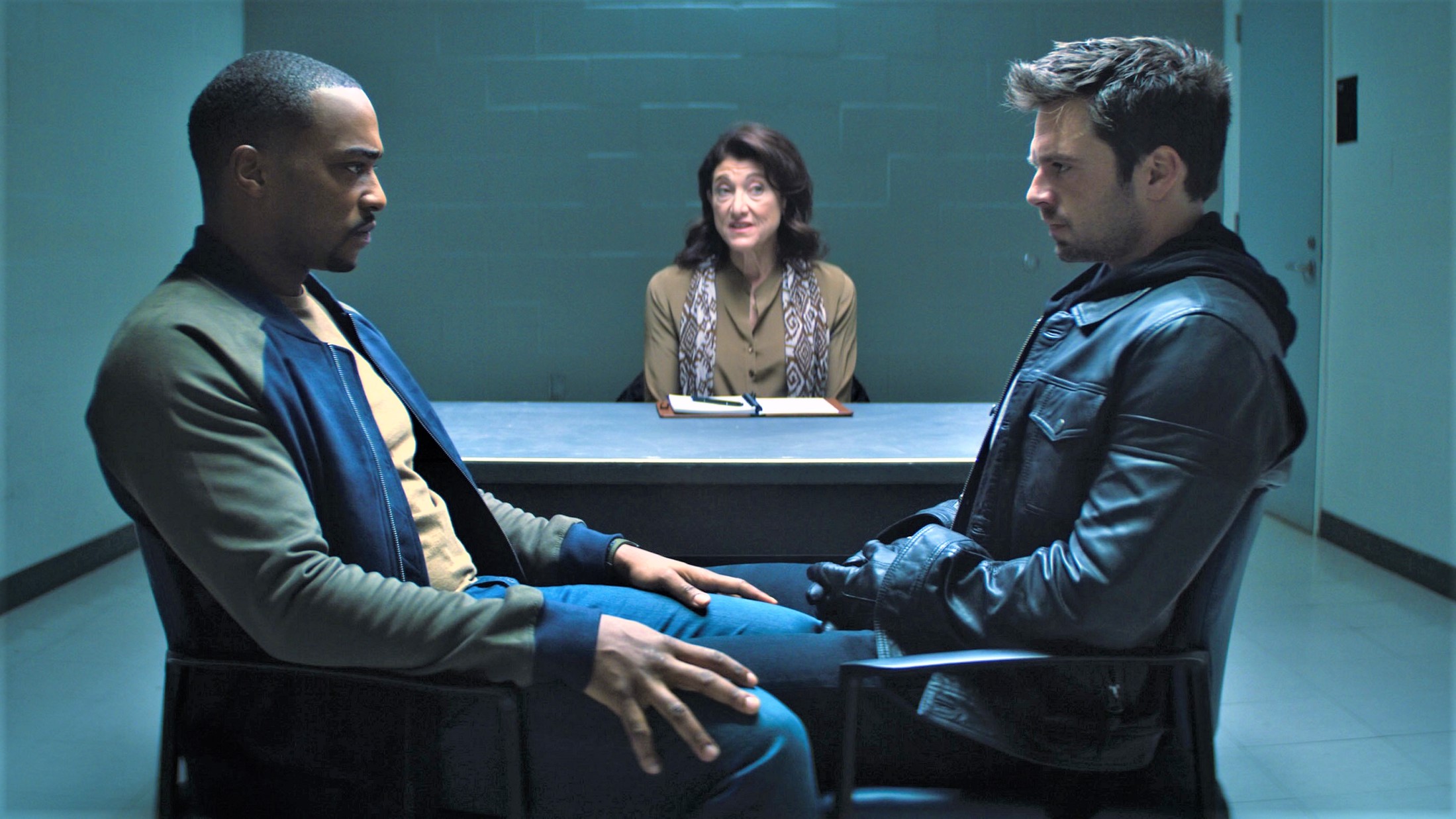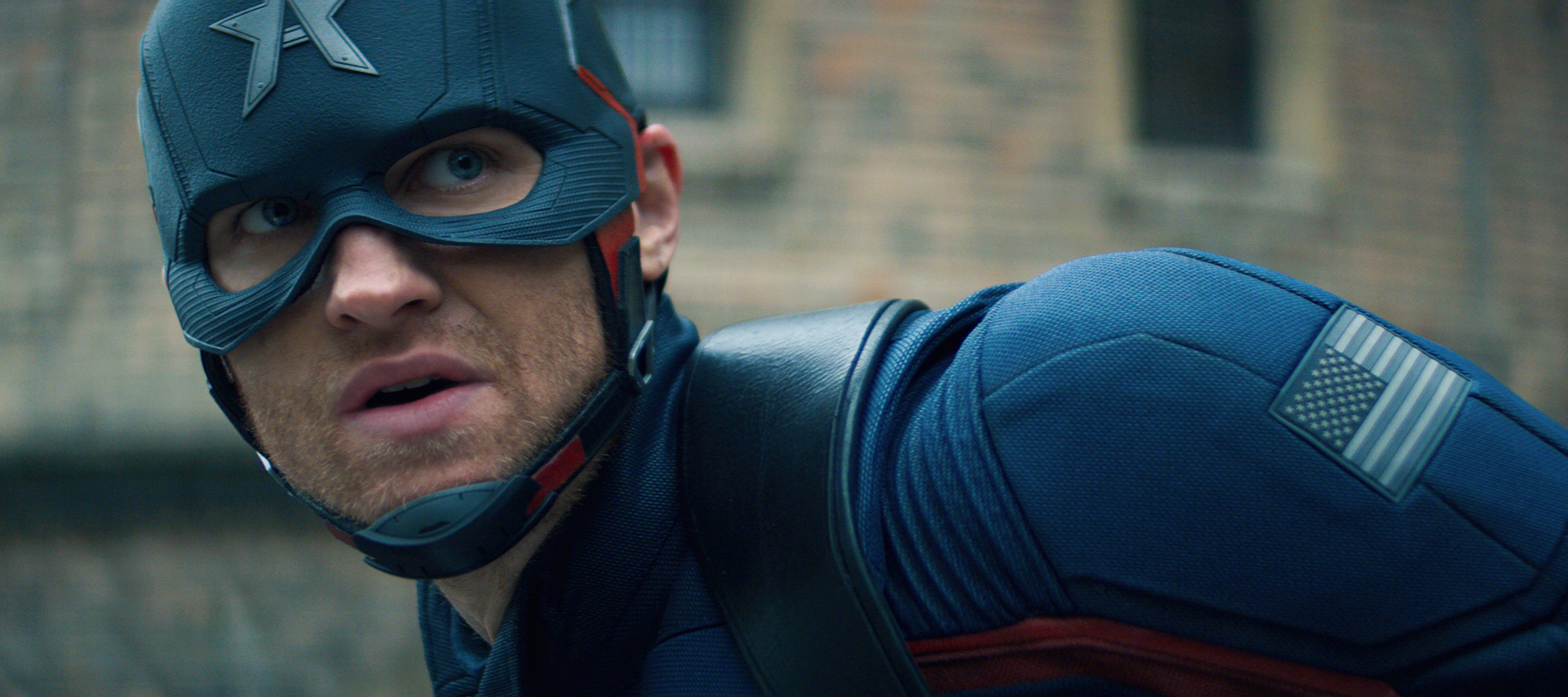Here’s my question: Why is The Falcon and the Winter Soldier such an unpleasantly macho show?
To me, macho means an exaggerated manliness expressed in violence, put-downs, and other displays of dominance. Think Rambo, think Dwayne Johnson and Jason Statham flexing and growling in each other’s faces, think (if you must) of frat bros doing keg stands or smashing cans on their chests, think of ads for trucks, think of a posture, a strut, an attitude — a capital-M Man trying to one-up another capital-M Man. Women are peripheral in macho stories, and if they appear at all, they can also be macho: think Gina Carano in everything she’s ever done.
The way I’m thinking about it, machismo is not necessarily toxic masculinity, though it’s surely related in ways it would take another essay to get into. Macho is the camp version of masculinity, which means sometimes it’s so exaggerated it’s funny. (e.g., The Rock flexing so hard he busts out of his arm cast.) But it also means that macho characters often have a “code” that requires them to protect those “weaker” than them (which is everyone). Machismo may not be completely corroding and perverting the way that toxic masculinity is; it’s just annoying. Don’t we have anything better to do than try to prove who’s a bigger man?
In Falcon and the Winter Soldier, I can see why John Walker, the new Captain America, would lean into his machismo; he’s got to prove himself up against a legend, he didn’t start the series with superpowers, so he needs a posture and a competition to prove he’s worthy of the shield. (He’s also a morally ambiguous character.) But he’s not the only one who feels over-machoed. Sam and Bucky posture and preen, punch and growl. Even Bucky’s therapist is a tough army gal, not here for your feelings, and when they meet up with old pal Sharon she’s been transformed into a cynical, brash mercenary. All added up, it feels like a nasty swamp of faux toughness, everyone trying to best each other at every opportunity, often punishingly so.
This attitude is epitomized in the couples therapy scene. The scene seems to have been conceived to pander to a slashfic-leaning audience. Imagine Sam and Bucky talking about their feelings face to face? Knee to groin, even??? And yet the scene as written and played reveals nothing about either of the characters except that they don’t want to be beaten or admit they have any flaws. More frustratingly, it doesn’t even make sense. Why are Sam and Bucky even in the room together? What questions is she trying to dig into, and why does she think this would help her actual patient, Bucky? What the hell does she care about their relationship? The only thing worse than being pandered to is being badly pandered to.
That scene, though, seems to hint at what the show was trying to do — and illustrates how it ultimately failed. The Falcon and the Winter Soldier was given the assignment to explore the emotions of these two formerly supporting characters, jointly dealing with the loss of their mutual best friend, but it wound up totally incapable of coherently stringing together a scene about that central loss.
I am aware that you can’t talk about loss in the MCU without bringing up WandaVision, and there’s no way to get around the fact that Falcon may look even more macho in comparison to the MCU’s most feminized product yet. WandaVision is literally a show about wanting to be a mom in the suburbs instead of fighting the end of the world. Its (anti-)hero and main villain are women, and the conflict is all about overpowering people’s minds rather than beating up their bodies. It even (famously? infamously?) takes a stab at defining grief and love. It’s also inventive, visually distinct, clever, and coherent — all areas where Falcon and the Winter Soldier suffers in comparison.
Though the ratio of male-led MCU films to female-led projects is still pitifully low and most of those projects are basically action movies, I would not consider the MCU in general particularly macho. From Iron Man’s first appearance he pokes fun at the tough army men driving him around. He’s a salesman and showman, and gets into the punching and hitting business by accident. His eventual best friend is a mild-mannered science nerd (most of the time). He’s a mentor to another nerd, this one a self-effacing eager teen. Captain America has a macho bod but he maintains the careful, watchful goodness he had before his transformation. Thor knows he’s perfect so doesn’t have to prove himself against anyone else. Ant-Man is goofy, Doctor Strange is obsessive. The Guardians of the Galaxy aspire to being macho but they’re misfits who don’t fit the mold.
But Bucky and Sam continued to play the macho game throughout their series, and I’m left trying to figure out why. The two of them have always been sidekicks (or in Bucky’s case, a villain). Then they lost Cap. Without the hero/sidekick relationship, perhaps they must resort to macho posturing, jockeying for the main-hero spot. Maybe the show is trying to tell us something about them as characters, as unpleasant as it is to sit through.
Or maybe it’s less a conscious choice and more of an unexamined default setting. It’s possible that in the absence of coherent, perceptive writing, these attractive, charismatic actors are reverting to a posture of machismo. Anthony Mackie and Sebastian Stan have been handed an opportunity to prove themselves, too. They aren’t given enough to do, and what they are given is muddled and unclear. So they puff up their chests and try to fake their way through it.
So much of what made Sam and Bucky interesting characters in the films is driven out of the TV show. In the movies, Bucky’s soulfulness shone through even when he was a killing machine, and Sam’s sunny, relaxed attitude allowed Steve Rogers to take a breather from saving the world. The show thinks it’s continuing that soulfulness and light, but how can it, when the characters are so obsessed with who’s the bigger man?
In the show, Bucky’s best line is a tossed-off “I’m right-handed.” Stan’s best acting is the sudden, horrible shock on his face when Ayo releases his arm — a moment he is instantly beaten, his macho strength gone. None of his awkward therapy sessions or tortured confessions work as well as those tiny moments. Sam’s best scene is when he tries to talk Karli down, his empathy his only superpower. In that moment — and when he hangs out with his adorable nephews — he seems competent, purposeful. Contrast that with his incoherent speech to reporters at the end of the show, which drives home how little show has earned any of its sweeping statements.
While Bucky and Sam muddle around trying to win some ill-defined prize, Zemo hangs around in the background, a nerd in a leather duster. He’s the one major character who isn’t painted with the macho brush. He’s totally unconcerned with who holds the shield. He lets his money speak for itself, and his schemes play out while he watches, invested but also disinterested. When the other characters are busy beating each other up, he saunters coolly out of the room. And even though he’s one of the worst villains in the MCU, fans seemed to like having him in the show–anything to contrast the constant one-upmanship. In contrast, the show indulges its most egregiously macho moment late in the season, with the undeserved redemption of John Walker. The show allows him to wander back into the action at the end and fight for “good” with absolutely no repercussions for being a straight-up murderer. Just because he can punch and he’s temporarily on the right side of things! Palling around with him taints the other characters by association.
Despite all of this, I have a lot of affection for Sam and Bucky. I want better for these characters. Imagine if the show had allowed a little warmth for its characters to radiate through, even if it meant sacrificing their images as the toughest guys in the room.
- THE FALCON AND THE WINTER SOLDIER’s macho problems - May 6, 2021
- Oh, How Things Have Changed - March 11, 2014
- The State of the Modern Vampire - February 14, 2014

